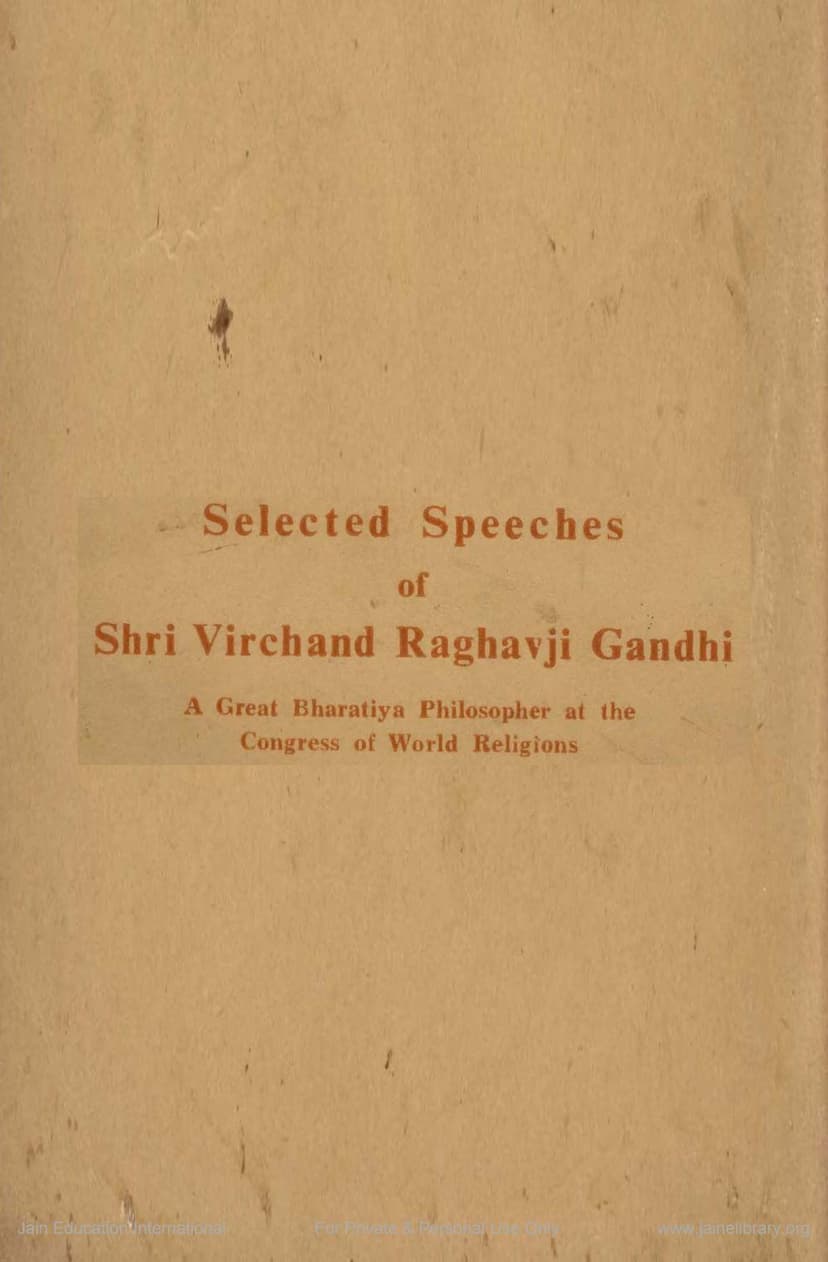Selected Speeches Of V R Gandhi
Added to library: September 2, 2025
Loading image...

Summary
This document is a compilation of speeches and a biographical sketch of Shri Virchand Raghavji Gandhi, a prominent Jain philosopher and exponent of Indian culture. Published by the Shree Vallabhsuri Smarak Nidhi, it aims to introduce his work and life to the younger generation.
Key Highlights and Themes:
- Shri Virchand Gandhi's Role: The book focuses on Gandhi's representation of Jainism at the Congress of World Religions in Chicago in 1893. He was deputed by Acharya Shri Vijayanandsuri (Atmaramji) Maharaj, as the Acharya himself could not attend due to the rules of conduct for Jain monks.
- Champion of Indian Culture: Gandhi is presented as a brilliant scholar and a great exponent of Indian culture and religion, whose speeches in America and Europe resonated with the true spirit of India.
- Jainism's Core Tenets: The speeches delve into fundamental Jaina philosophical concepts, including:
- Nayas (Perspectives): Dravyārthikanaya (substance perspective) and Paryāyārthikanaya (mode perspective).
- Dharma (Religion): Divided into Śruta Dharma (philosophy) and Caritra Dharma (ethics).
- Nine Principles: Soul, non-soul, merit, demerit, the causes of merit and demerit, the stopping of inflow of karma (Saṁvara), destruction of karma, bondage of soul, and liberation (Moksha).
- Substance: The division into sentient and insentient matter, and the role of ether, space, and time.
- Living Beings: Detailed classification based on the number of senses.
- States of Existence: Naraka (hell), Tiryac (animal/lower forms), Manusya (human), and Deva (celestial).
- Origin of the Universe: Jainism posits that matter and soul are eternal and uncreated, rejecting the concept of a creator God in the Western sense. The universe is viewed as a system governed by inherent laws.
- God: Jainism denies an extra-cosmic personal creator. Instead, it recognizes a subtle essence underlying all substances, which is the eternal cause of modifications, sometimes referred to as "God."
- Transmigration and Karma: The doctrine of Karma is central, explaining the cycle of birth, death, and rebirth. Karma is divided into eight classes that influence one's destiny. Right knowledge, faith, and conduct lead to the destruction of Karma and liberation.
- Ethics: Emphasizing the principle of looking upon all living beings as oneself. The five Mahāvratas (great vows) for ascetics are highlighted: non-violence, truthfulness, not stealing, celibacy, and non-possession.
- Critique of Materialism and Design: Gandhi questions the concept of "design" in nature, suggesting it arises from limitations of power and offers a Jaina perspective on the universe's inherent order.
- Reconciliation of Religions: Gandhi's philosophy emphasizes examining religious systems from all standpoints, illustrated by the famous parable of the elephant and the blind men. He advocated for tolerance and understanding between different faiths.
- Addressing Misconceptions about India: Gandhi actively worked to correct prevalent, often negative, impressions of India and its culture in the West, often arising from the biased accounts of Christian missionaries. He defended Indian traditions and practices with clarity and conviction.
- Jaina Psychology: The speeches touch upon the Jaina understanding of knowledge acquisition through senses, study, psychic faculties, mind-knowing, and absolute knowledge.
- Syādvāda and Anekāntavāda: These Jaina principles of multi-sidedness and conditional predication are presented as unique contributions to philosophical inquiry, enabling reconciliation of seemingly contradictory viewpoints.
- Biographical Sketch: The book includes a life sketch by H. H. Dalal, detailing Gandhi's birth in Mahuva, his education in Bhavnagar and Bombay, his graduation with honors, and his early involvement in the Jain Association of India. Significant achievements like the removal of the pilgrim tax and the successful appeal in the Sammet Shikar piggery case are mentioned.
- International Impact: Gandhi's extensive travels and lectures in America and Europe are highlighted, showcasing his ability to captivate audiences and spread the message of Jainism. His eloquence, intellectual prowess, and noble character earned him widespread admiration.
- Legacy: The publication aims to inspire the younger generation with Gandhi's ideals of scholarship, devotion, tolerance, and selfless sacrifice, remembering him as a great son of India who passed away at a young age.
In essence, "Selected Speeches of V. R. Gandhi" serves as a tribute to a pivotal figure in the global dissemination of Jain philosophy, showcasing his intellectual depth, oratorical skills, and dedication to presenting the rich spiritual heritage of India to the world.